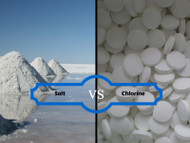Tired of dumping chemicals into your pool? Tired of what the chlorine in your water is doing to your skin and eyes? Tired of that chlorine smell?
Well, the good news is that there is an alternative to all that. Have you ever considered converting your pool to salt water? A salt water pool can be a great alternative to the traditional chlorine-based system and can have significant benefits. If you are not aware of the benefits of salt water systems for your pool, you have come to the right place. With that in mind, here is a helpful guide to salt water systems.
What are Salt Water Systems?
It is always helpful to start at the beginning and address the question of what exactly is a salt water system. The most important thing to note is that a salt water pool does technically have chlorine. It just comes about it differently. So, ultimately what you have is an alternative to chlorine through a process that creates chlorine in a more natural manner.

Maintaining a Salt Water Pool
If you are seriously considering converting your pool to a salt water system, it will be helpful for you to know how to maintain it as it differs in approach to your traditional chemical-based pool. This will help to ensure that you get the longest life possible out of your chlorinators. The first thing you will want to be sure to do is to make sure the salt level of your pool stays between 2700 and 3900 ppm. This can be done by use of a salinity meter such as the SLTD-100 salinity / TDS meter. A salinity meter will help you monitor the salt level of your pool and give you the needed information to know when it is time to add more salt.
In addition to a salinity meter, it also helps to clean your chlorinator cell seasonally, deactivate your chlorinator in the event of a storm in order to avoid a potential power surge, ensure your calcium levels stay low and only use chlorinators that have reverse polarity. This is to ensure that the cell does not have any scale buildup.
The Longevity of Salt Water Chlorinators
By following the techniques listed above, you can expect your salt water chlorinators to last awhile with up to 7 years of longevity. Just make sure you are cleaning your chlorinators properly and avoid cleaning too often as this can wear out your chlorinator quicker.
Why Convert to Salt Water?
So why convert to salt water? What benefits does salt water have over traditional chemical-based pools? One significant benefit is that they require less maintenance as you will not have to constantly be adding chlorine. Additionally, salt water systems have the benefit of being less expensive as you will not have to fork over so much money for pool chemicals. And of course with a salt water system you won't have to worry about the irritation that pool chemicals cause on the skin and eyes and you can finally say goodbye to that chlorine smell.
If you are ready to switch to a salt water system for your pool, please let us know. We look forward to improving your swimming experience!

